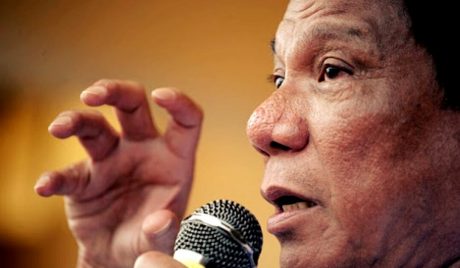
Leading presidential candidate Rodrigo Duterte is unstoppable. He does not only weather storms, he thrives in them. The latest witchhunt launched by disgruntled vice presidential candidate Antonio Trillanes (who consistently ranks near bottom in the many surveys taken so far) was a mere blip on his radar. Duterte’s fans remain adamant in their choice, and all this latest Trillanes stunt had achieved was to keep Duterte’s face trending on headline news.
All those who stand in Duterte’s way are now perceived by the vast voter base who have rallied behind him as the people who failed to deliver on their promise. Duterte’s detractors, for their part, remain baffled by this massive support. Duterte’s supports are, as one “thought leader” puts it, “not a fringe group of reactionary fanatics” as most “civil” Filipinos would like to believe. They are, “neighbors, friends, the old high school classmates who drive their children to school and post pictures of Jesus and Coach bag discounts.” In short, Duterte’s appeal to the Filipino public draws from a deeper need that transcends social class.
Why are Filipino voters going for broke and betting on a Duterte presidency? Perhaps it is because there never has been any true revolution in the Philippines that had truly been won. The 1986 people power “revolution” was anything but. There was nothing revolutionary about it. It wasn’t even transformational. It was a fresh coat of paint applied to a termite-infested house.
Duterte’s revolution, to many Filipinos, comes across as real. In contrast to Cory Aquino’s, and subsequent presidents who followed her, sucking up to American dole-outs, Duterte spits out the teat that had, in all ironic glory, nourished Filipino “independence” since 1946. He stands apart from the tired and flaccid “decency” of the Philippines’ so-called “civil society” and the quaint politically-correct platitudes that pepper their campaign slogans and their “trending” Twitter discussions. To the nebulous “unity” espoused by the traditional guard of Imperial Manileno politics, Duterte proposes that the artificial country known as “the Philippines” be broken up into a loose federation of autonomous states where Muslims can be Muslims, Sagadas can be Sagadas, Cebuanos can be Cebuanos, and the Taga-Ilogs can be, well, the same apathetic mallrats they’ve always been.
This is where Duterte’s supporters are coming from. Duterte is different. He is unlike anything ever seen in Philippine politics. He is baffling to those who fail to cast an empathetic eye upon Duterte’s base of supporters. These are people who have as much a legitimate claim to “the mainstream” as those who have traditionally regarded themselves as “the mainstream”, the latter being those who wax nostalgic about their contribution to the 1986 “revolution” and who have, as a matter of routine, looked to those whe beg to differ to them as being outside of their “mainstream”.
In that fact alone lies the reason why it is pointless to demonise Duterte any further and why continuing to do so will merely make him more powerful and his supporters even more resolute in their choice. It has come to a point where everything the old “mainstream” has to say merely rings hollow to a jaded Filipino public. Duterte’s rise is the result of 30 years of unparalleled squandering of priceless political capital that saw its peak market value in 1986.
Duterte is the revolution denied Filipinos in 1986.
* * *
Epilogue:
The thing with referring to social media as a means to check the “mood” of Philippine society is that it is an inherently inbred source of information. We get information from people we opt into following. In that way we limit our exposure to information and opinion that is biased to our own preconceived notions.
That a once obscure mayor from Mindanao would rise to prominence right under the noses of Manila’s noisy clique of “civil society” Netizens attests to the poison social media “activism” can deliver if used unintelligently.
[Photo courtesy Daily Mail.]

No comments:
Post a Comment